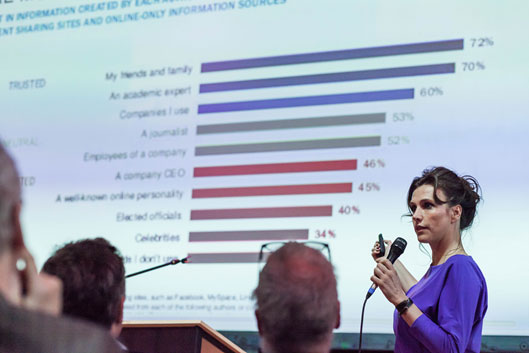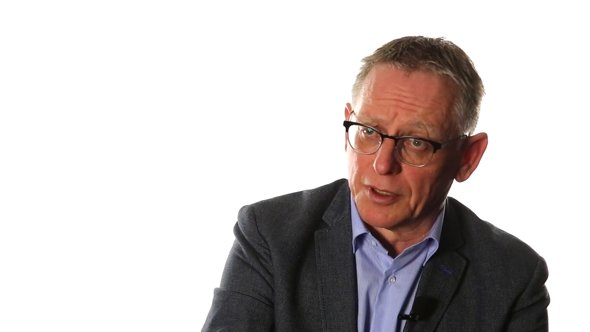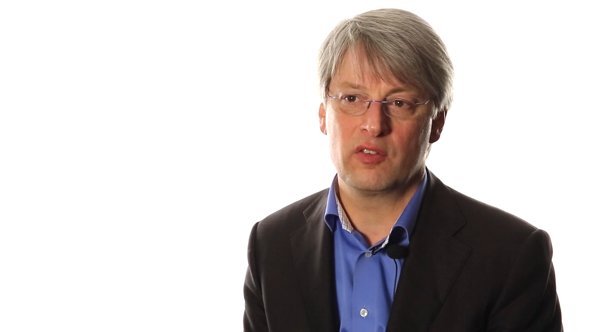Darwin's Game
Scenario 04. Media is evolving; transparency is the magic word
What will journalism look like in 2025? To find out, the Journalism Fund developed four potential scenarios for the future. The following is scenario 04. Darwin's Game: A society in which citizens still depend on large companies and organisations (do it for me) and citizens show (reluctance) to make use of new technology.

The scenarios are based on the input of 150 stakeholders from inside and outside the sector. Read more about how the scenarios came about.
MethodTraditional media companies are finding it tough and not everyone survives
Brands that are able to adapt and work with start-ups have the best chance in the future
Government agencies and media companies know how to evolve and manage traditional news brands to make themselves relevant again. By being more transparent and accessible, media companies manage to hold back the explosive decline in viewers and subscribers. Dialogue with readers and viewers plays an important role. The public places great demands on journalism and is not very loyal to specific brands.
The participation society never really got off the ground. Citizens demonstrate that they are not so caring as first thought. They find that the government can organise many tasks more efficiently, but wish for more public participation and transparency. The government and its institutions listen to that criticism and win back the confidence of the public
Journalism is also heavily criticised. Citizens attach little value to the role of the watchdog that journalism itself believed was so important. The citizen believes that other functions are much more important, such as suggesting solutions and providing a forum for debate. Many people are also annoyed that journalism is rarely accountable for mistakes and never explains editorial choices. The journalistic sector takes the criticism to heart and adapts accordingly. Not only because of the falling viewing and circulation figures, but also because the sector is aware that without trust there is no role for journalism.

Marcel van Lingen, ANP
Where editors often used to be sceptical about innovation, the course has been changed completely. News organisations are increasingly listening to readers and viewers, and they also work actively with them. Journalism is no longer a one-way street and transparency is an absolute requirement for journalism in 2025. One example of this transparency is the ability to immediately download the source material of online articles, or the full transcript of an interview.
Many Dutch have the feeling that life is confusing and unsafe. The abundance of information available on the internet is confusing. It is difficult to separate the wheat from the chaff. Which version is correct? What source can you trust? This is the task for the journalists. They can offer review, direction and interpretation and relieve 'information stress'. Thanks to the need for this journalistic function and the changes that have taken effect, a large part of society returns to traditional media organisations.

Despite the great openness to change within the sector, not all publishing houses are able to survive. In 2025, there will only be one national morning newspaper and one evening newspaper. Both appear every day, in both paper and digital formats. There are hardly any regional newspapers any more, but there is a wide range of websites with a local or regional focus.
There is just one national morning newspaper and one evening newspaper.
Also, those companies that wish to carry on must still make cutbacks and enter into far-reaching collaborations to keep their heads above water. Many organisations work with small newsrooms, where a group of permanent employees manage a pool of freelancers. In addition to the traditional media organisations, there are several journalistic start-ups active in the Netherlands. They know how to appeal to a younger audience. Traditional media companies and start-ups exist together and regularly work with one another in relative harmony.

Marcel van Lingen, ANP
Young adults remain a hard-to-reach audience for traditional media. They do not feel connected to the 'old' brands and the tone they use. These millennials get their news via digital and mostly international media. Few people are willing to pay for news. Most are satisfied with the free content that is offered. High-quality news and investigative journalism are products that a small group of people are willing to pay for. Traditional media focuses primarily on the over-sixties, because they are loyal and willing to pay for news.
Online media organisations offer a freemium model: part of the content is free, the rest must be paid for. Additional income is obtained through webshops and branded journalism: sponsored posts and videos. The latter occurs in two forms: First, brands manage their own content with high-quality journalism. Second, journalists produce customised content for advertisers. Branded journalism is an especially popular source of income for sites that focus on young people. Young people have no qualms about sponsored coverage, with the proviso that an editor makes clear which articles and videos are sponsored and which are not.
Ebele Wybenga, expert branded journalism
The unbundling of news continues. If desired, it is possible to pay per article or video for news, rather than buy a complete newspaper. Online news is enriched with video, live streams, interactive maps and data visualisations. Media use digital methods to personalise news: websites are adapted based on location, amount of time the consumer has available and interests.
News has always been offered in bundles: you buy a newspaper full of articles and supplements, or you watch a news broadcast with many different news items. Technological development makes it easier to offer individual stories: You can now buy a single article or watch one fragment of a talk show.
Large companies like Facebook and Google still play an important role in the distribution of digital content, but have not achieved a monopoly. Newsmakers distribute their productions through their own channels as well as Facebook and YouTube. The public sees social media as an unreliable source of information and do not use it as a reference for news stories. If someone wants to know what's really going on during a disaster or other major event, they turn to one of the most trusted news brands.
The speed of technological development decreases. The focus shifts from developing more new devices to the optimal use of existing technology. New products are only introduced once the old products have been milked dry.

Use your smart TV to request the transcripts of an interview
Television, smart phones and radio still play an important role in our daily lives. The smart TV in the living room has become much more important. This smart television is essentially the largest tablet in the house and is mainly used for streaming video. That could be news, but could also be movies, music and YouTube videos. Old-fashioned 'cable TV' is just one of the many apps available on your smart TV. The public broadcaster remains largely intact, and all three public channels still exist. However, production companies and the public have been given a greater say in what is offered. Substantial cuts put the system under pressure, but the popularity of familiar faces hold the viewing figures and advertising revenues stable. In addition, the public broadcaster has a clear function: to provide interpretation and oversight to reduce the citizen's information stress.

Marcel Gelauff, from the Dutch news agency, NOS
Journalism as a service becomes much more important
Journalism in 2025 not only focuses on exposing abuses but also helps provide solutions to problems, facilitates discussion and actively co-operates with citizens. For example, viewers will decide which topics will be dealt with or readers will explore an item under the direction of an editorial team. Service journalism, which offers readers applicable information, is becoming increasingly popular. This means articles that help the reader in many different areas such as: to help make a choice in elections, provide advice about switching to a different energy supplier or give tips for buying a house.